|
|
|
Sort Order |
|
|
|
Items / Page
|
|
|
|
|
|
|
| Srl | Item |
| 1 |
ID:
164285
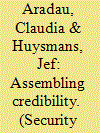

|
|
|
|
|
| Summary/Abstract |
Critical approaches in security studies have been increasingly turning to methods and standards internal to knowledge practice to validate their knowledge claims. This quest for scientific standards now also operates against the background of debates on ‘post-truth’, which raise pressing and perplexing questions for critical lines of thought. We propose a different approach by conceptualizing validity as practices of assembling credibility in which the transversal formation and circulation of credits and credentials combine with disputes over credence and credulity. This conceptualization of the validity of (critical) security knowledge shifts the focus from epistemic and methodological standards to transepistemic practices and relations. It allows us to mediate validity critically as a sociopolitical rather than strictly scientific accomplishment. Developing such an understanding of validity makes it possible for critical security studies and international relations to displace epistemic disputes about ‘post-truth’ with transversal practices of knowledge creation, circulation and accreditation.
|
|
|
|
|
|
|
|
|
|
|
|
|
|
|
|
| 2 |
ID:
106304


|
|
|
|
|
| Publication |
2011.
|
| Summary/Abstract |
This article portrays the first decade of Internet connectivity in Israel. It focuses on the technology of the Internet, i.e. on the cables and wires that carry the Internet around the world, and on the bureaucratic processes that are called into play as the Internet reaches a new country. While the Internet appears to be a supranational technology, its institutionalization in Israel - and indeed throughout the world - can be seen to have been heavily dependent on state-level machinations, thereby inviting a somewhat more Westphalian approach than might be considered appropriate when dealing with such a global phenomenon as the Internet.
|
|
|
|
|
|
|
|
|
|
|
|
|
|
|
|
| 3 |
ID:
138070
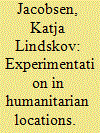

|
|
|
|
|
| Summary/Abstract |
Amid good intentions, such as providing humanitarian assistance to refugees, the use of biometric technology in humanitarian refugee management may entail various risks for the implicated refugee populations. Drawing on insights from science and technology studies, this article introduces a distinction between risks stemming from technology failure and risks stemming from successful uses of biometric technology. The article thus departs from the literature in which technology failure has been in focus by showing that analysing the effect of technology success adds an important dimension to our analysis of the range of risks that may emerge in the context of humanitarian technology uses. The usefulness of this distinction is then illustrated through an analysis of the use by the United Nations High Commissioner for Refugees (UNHCR) of iris recognition in the repatriation of Afghan refugees; besides risks of failure at the implementation stage, risks also emerged once refugees had successfully registered their biometric data with UNHCR. To recognize how humanitarian refugee biometrics produces digital refugees at risk of exposure to new forms of intrusion and insecurity, we need to appreciate how successful technology can have critical implications arising from how technology is constituted in and constitutive of social phenomena.
|
|
|
|
|
|
|
|
|
|
|
|
|
|
|
|
| 4 |
ID:
141209
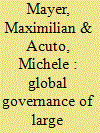

|
|
|
|
|
| Summary/Abstract |
The importance of technology in global affairs is visible to the naked and uninitiated eye. Yet International Relations (IR) still lacks a more systematic and critical attention to the role of technological infrastructures in contemporary global governance dynamics. Here, we seek to prompt IR scholars to move ‘large technical systems’ (LTSs) from the contours of IR narratives to a centre stage, as they hold the potential to respond to pressing challenges for IR scholarship. Employing LTSs to respond to recent publications on the challenge that ‘global governance’ poses to IR, we highlight that an STS-IR encounter can, first, revitalise ‘grand questions’ at the heart of IR and, second, help coping with the complexity of global governance. While this encounter does not offer a ready-tailored panacea for the troubles of IR, a more systematic inquiry into LTSs is a powerful step beyond theoretical and methodological impasses, towards greater inter-disciplinary collaboration.
|
|
|
|
|
|
|
|
|
|
|
|
|
|
|
|
| 5 |
ID:
193303
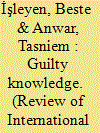

|
|
|
|
|
| Summary/Abstract |
This article studies practices of knowledge production during counterterrorism financing court cases in European courts. Developments in international law have contributed to novel regulations to criminalise and prosecute the funding of terrorism in advance of terrorist violence. In this study, we study how court cases have become important spaces for contesting and evaluating multiple knowledge claims on terrorist threat and suspicion by analysing case proceedings from both the Netherlands and the United Kingdom. Building on recent debates in International Relations and postcolonial theory, we make two contributions. First, building on insights from postcolonial literature on ‘abyssal thinking’, we illustrate how legal practices differentiate between different ways of knowing by dismissing certain experiences as ‘emotional’ or ‘subjective’ in contrast to the assumed objectivity of other knowledge claims. We argue that decisions on what counts as knowledge in a court setting are situated in a specific sociopolitical setting, whereby particular knowledge and life-worlds are recognised at the expense of others. Second, we empirically show how the novel criminal laws shifts the responsibility to know terrorist threat from the state to ordinary citizens. We illustrate how the court reinforces new security logics where the state can entertain doubt, uncertainty, and trust in their practices, while the citizens cannot.
|
|
|
|
|
|
|
|
|
|
|
|
|
|
|
|
| 6 |
ID:
163052
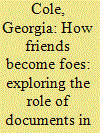

|
|
|
|
|
| Summary/Abstract |
In issuing and circulating a litany of documents, organisations produce statements with important textual and material qualities and affects. While a discursive analysis focuses on the former, interrogating how language is used, this paper propounds the need to explore the physicality of these objects too and adopts several heuristic devices to do so. First, it outlines how the issuance of certain documents within the refugee regime suppresses within a ‘black box’ the supporting and competing narratives that resulted in their genesis. Second, and relatedly, it considers why particular announcements are capable of catalysing responses that outlive their authors’ finite intentions. Tracing the genealogy of these documents is thus argued to be critical for explaining the persistent and yet unpredictable influence of ideas, interests and pressures on institutional conduct, even long after their proponents have changed tack. By illustrating why greater attention should be paid to the ways that material objects can come to shape organisational behaviour, in this case legal texts, this article complements existing theoretical frameworks used to explain UNHCR’s conduct. This helps explain how, when and why non-legally binding declarations nonetheless came to bind UNHCR’s actions as it attempted to cancel the status of Eritrean refugees in 2002.
|
|
|
|
|
|
|
|
|
|
|
|
|
|
|
|
| 7 |
ID:
152103


|
|
|
|
|
| Summary/Abstract |
Recent breakthroughs in neuroscience have led to increasing concern about its uses in warfare. This article challenges the primacy of dual-use frameworks for posing ethical questions concerning the role of neuroscience in national security. It brings together three fields – critical war studies, bio-ethics, and the history of medicine – to argue that such frameworks too starkly divide ‘good’ and ‘bad’ military uses of neurotechnology, thus focusing on the degradation of human capacities without sufficiently accounting for human enhancement and soldier rehabilitation. It illustrates this through the emergence of diagnoses of Traumatic Brain Injury and Polytrauma in the context of post-9/11 counterinsurgency wars. The article proposes an alternative approach, highlighting the historical co-production and homology of modern war and medicine so as to grapple with how war shapes neuroscience, but also how neuroscience shapes war. The article suggests new routes for thinking through the connections between war, society, science, and technology, proposing that we cease analysis that assumes any fundamental separation between military and civilian life.
|
|
|
|
|
|
|
|
|
|
|
|
|
|
|
|
| 8 |
ID:
177946


|
|
|
|
|
| Summary/Abstract |
In this article, we show how Annemarie Mol's notion of ontological politics helps to open up the research agenda for cyber security in Critical Security Studies. The article hence seeks to further the debate about STS and Critical Security Studies. The article's main claim is that the concept of ontological politics enables an engagement with the complex and transformative dynamics of ICT and the new security actors and practices that shape security politics in the digital age. By examining the virulent attacks executed by the Mirai botnet – one of the world's largest, fiercest, and most enduring botnets – we point to four aspects of cyber security that attention to the ontological politics of cyber security attunes us to: the proliferation and entanglement of security agencies, actors, sites, and spaces. These aspects of cyber security, we argue, are becoming increasingly prominent alongside the development of the Internet of Things (IoT) and 5G network technology. In conclusion, we discuss the wider security theoretical and normative-democratic implications of an engagement with the ontological politics of security by exploring three avenues for additional conversation between ontological politics and Critical Security Studies.
|
|
|
|
|
|
|
|
|
|
|
|
|
|
|
|
| 9 |
ID:
193300
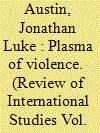

|
|
|
|
|
| Summary/Abstract |
How do people know how – very practically speaking – to be violent? This article explores that question through a Science and Technology Studies perspective. It does so in order to go beyond the usual location of global political violence at a structural level that attributes its emergence principally to hierarchical orders, formal training, or deep cultural, political, or ideological factors. The alternative explanation offered here draws on Bruno Latour's concept of ‘plasma’ to sketch a theory of how practices of violence are embedded at a distributed ontological level through the historical accumulation of (popular) cultural, textual, technological, and other epistemic objects. In making that claim, I seek to stress how violent knowledge circulates outside the formal domains associated with it (the military, police) and is instead preconsciously accessible to each and every person. To support this argument, the article draws on empirical examples of the use of torture, including interviews conducted with Syrian perpetrators of torture, as well as by tracing the paradoxical entanglements between scientific practice and the practice of torture. I conclude by engaging the field of preventive medicine to speculate on the need to develop modes of violence prevention that appreciate political violence as a population-level sociopolitical problem.
|
|
|
|
|
|
|
|
|
|
|
|
|
|
|
|
| 10 |
ID:
105953
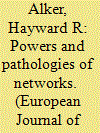

|
|
|
|
|
| Publication |
2011.
|
| Summary/Abstract |
This article reconstructs Karl Deutsch's fearful yet hopeful views about the powers and
pathologies of military, and other, national and international network systems. These
views presuppose Norbert Wiener's Cybernetic Interpretive Hypothesis: that 'society
can only be understood through a study of the messages and communication facilities
which belong to it'; that the societal trend is towards more computerized communication
systems; and that they embody an 'open vs. closed' living systems ethos. Drawing on
science and technology studies by Edwards and Mirowski, the author suggests how
Deutsch's and Wiener's prophetic hopes, fears, and insights can also enrich and redefine
contemporary debates about the historical-technological development of our national
societies, the powers and pathologies of game-theoretically programmed computer
networks, the assessment of the life-preserving potential of our partly automated
security systems, the major threats from the continued poverty of the less developed
world, problems of decentralized governance, and the political, ethical, and religious
justifications for our national, international, and civilizational identities and purposes.
|
|
|
|
|
|
|
|
|
|
|
|
|
|
|
|
| 11 |
ID:
131818
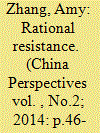

|
|
|
|
|
| Publication |
2014.
|
| Summary/Abstract |
This article examines the logic and framing of homeowner protests against Waste to Energy (WTE) incineration in Guangzhou. I argue that the concept of "rational resistance" emphasised by homeowner activists represents one way of understanding urban environmental contention in China. Urban homeowners use rational resistance to distinguish themselves from both villagers and the state. Their focus on rationality is a critique of the government's reliance on technology to resolve the social problem of waste management.
|
|
|
|
|
|
|
|
|
|
|
|
|
|
|
|
| 12 |
ID:
181637
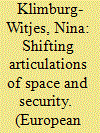

|
|
|
|
|
| Summary/Abstract |
European space policy is currently at a watershed. In 2021, there will be two institutions responsible for European space activities: The EU Space Agency (EU SPA) and the civilian European Space Agency (ESA) founded in 1975. This article investigates how new objectives and governance scheme(s) of European space activities reflect the increasing securitisation of space in Europe. Linking work in critical security studies to the concept of boundary work from science and technology studies (STS) I outline three phases of boundary work – expansion, expulsion and protection of autonomy – that all show how the dividing lines between peaceful and militarised space activities have become increasingly blurred. The conclusion argues that we currently witness a shift in the visions of European integration in space, with ESA remaining outside the EU framework and open to non-EU members while the EU SPA is accessible to EU members only and explicitly dedicated to the use of space for security. As the strategic potential of outer space is likely to grow, the paper offers a critical empirical investigation of the ongoing transformation in European space policy that has significant consequences for how we envision a “united Europe in space”.
|
|
|
|
|
|
|
|
|
|
|
|
|
|
|
|
|
|
|
|
|